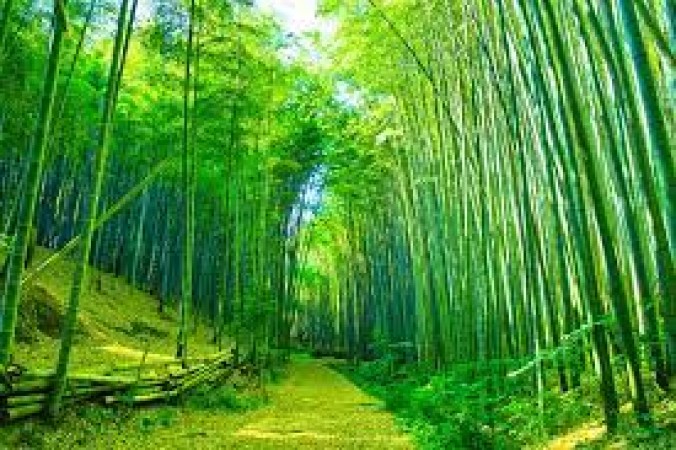
Bamboo is an extraordinary plant known for its rapid growth and diverse uses. With a growth rate of up to 3 feet (0.91 meters) per day, it holds the title of one of the fastest-growing plants on Earth. This article explores the fascinating characteristics of bamboo, its incredible growth capabilities, and the various ways it impacts our lives.
Introduction: Bamboo, a member of the grass family, is renowned for its rapid growth and versatility. This remarkable plant has captivated people for centuries, not only due to its aesthetic appeal but also because of its incredible growth rate. In this article, we will delve into the world of bamboo and explore the factors that contribute to its impressive growth, its ecological importance, and the countless ways it benefits human society.
The Growth of Bamboo-
Factors Affecting Growth: Bamboo's exceptional growth can be attributed to several key factors. First and foremost, it thrives in regions with warm climates and ample rainfall, providing the ideal conditions for rapid growth. Additionally, bamboo possesses a unique rhizome-based root system that enables it to absorb nutrients efficiently and quickly establish new shoots.
The Structure of Bamboo: The structure of bamboo is another fascinating aspect contributing to its growth. Its tall, hollow culms, which are segmented and jointed, play a crucial role in its ability to grow swiftly. These culms, reinforced by fibers, provide strength and flexibility, making bamboo resilient against various environmental conditions.
Bamboo in Nature
Bamboo Species and Distribution: Bamboo encompasses a vast array of species with diverse characteristics and distributions. From towering giants to delicate shrubs, bamboo can be found in different parts of the world. It is prevalent in Asia, particularly in countries such as China, India, and Indonesia. However, bamboo also grows in other regions, including parts of Africa, the Americas, and Australia.
Bamboo Forests and Ecosystems: Bamboo forests create unique ecosystems that support numerous plant and animal species. These forests contribute to biodiversity conservation by acting as habitats for various creatures, including endangered species such as the giant panda. Bamboo forests also play a significant role in maintaining water resources and reducing soil erosion.
Bamboo's Versatility:-
Construction and Architecture: Bamboo's strength and flexibility have made it a favored material for construction and architecture. It has been used for centuries in the creation of buildings, bridges, and scaffolding. Modern architects and designers continue to explore bamboo's potential, utilizing it in innovative ways to create sustainable and aesthetically pleasing structures.
Bamboo in Furniture and Crafts: Bamboo's natural beauty and durability make it a popular choice for furniture and crafts. From elegant bamboo flooring to intricately designed furniture pieces, it adds a touch of sophistication to any space. Skilled artisans also create stunning handicrafts using bamboo, showcasing its versatility and artistic potential.
Bamboo as a Sustainable Resource: One of the most significant advantages of bamboo is its sustainability. Unlike traditional timber, bamboo can be harvested without causing permanent damage to the plant or its surrounding environment. Its fast growth rate ensures a constant supply of raw materials, making it an environmentally friendly alternative to traditional wood sources.
Bamboo in Asian Culture:-
Bamboo Symbolism and Traditions: Bamboo holds deep cultural significance in many Asian countries. Revered for its strength, resilience, and flexibility, bamboo has become a symbol of virtue and moral character. It is often associated with qualities such as integrity, humility, and adaptability. Bamboo also features prominently in traditional festivals and ceremonies, signifying good fortune and prosperity.
Bamboo in Art and Literature: Throughout history, bamboo has inspired countless artists and writers. Its graceful form and delicate leaves have been depicted in paintings, calligraphy, and poetry, capturing the essence of tranquility and natural beauty. Bamboo-themed artworks continue to evoke a sense of harmony and appreciation for nature in the hearts of art enthusiasts worldwide.
The Environmental Benefits of Bamboo:-
Carbon Sequestration: Bamboo plays a vital role in mitigating climate change by acting as a carbon sink. As bamboo grows rapidly, it absorbs significant amounts of carbon dioxide from the atmosphere, helping to reduce greenhouse gas emissions. This ability to sequester carbon makes bamboo an important resource in the fight against global warming.
Soil Conservation and Erosion Prevention: The extensive root network of bamboo helps prevent soil erosion, particularly on hillsides and riverbanks. The interlocking roots bind the soil together, reducing the risk of landslides and preserving fertile land. Bamboo's ability to stabilize soil makes it an effective tool for erosion control and land restoration efforts.
Bamboo for Sustainable Living:-
Bamboo as a Renewable Material: In an era where sustainability is of paramount importance, bamboo stands out as a renewable resource with a multitude of applications. Its fast growth cycle allows for frequent harvesting, ensuring a continuous supply of raw material. From flooring and paneling to kitchenware and utensils, bamboo products offer an eco-friendly alternative to non-renewable materials.
Bamboo for Clothing and Textiles: Bamboo fibers have gained popularity in the textile industry due to their softness, breathability, and antibacterial properties. Bamboo-based fabrics are sustainable alternatives to conventional textiles, offering comfort and style while reducing the environmental impact of the fashion industry. Bamboo clothing and textiles are becoming increasingly sought-after by eco-conscious consumers.
Bamboo as a Food Source: Beyond its industrial and artistic uses, bamboo also serves as a source of nourishment. Certain bamboo shoots are edible and widely consumed in various Asian cuisines. Rich in nutrients and low in calories, bamboo shoots offer a unique flavor and texture, adding depth to dishes while providing a healthy dietary option.
Conclusion: Bamboo's exceptional growth rate and remarkable versatility make it a plant of immense value. From its environmental benefits to its cultural significance, bamboo's impact extends far beyond its rapid growth. As we embrace sustainable living and strive for a greener future, bamboo serves as a shining example of a renewable resource that offers countless opportunities for innovation, creativity, and positive change.
Remembering MS Viswanathan: Honoring the Legacy of a Musical Maestro
Bastille Day: Celebrating France's National Holiday and Revolutionary Spirit